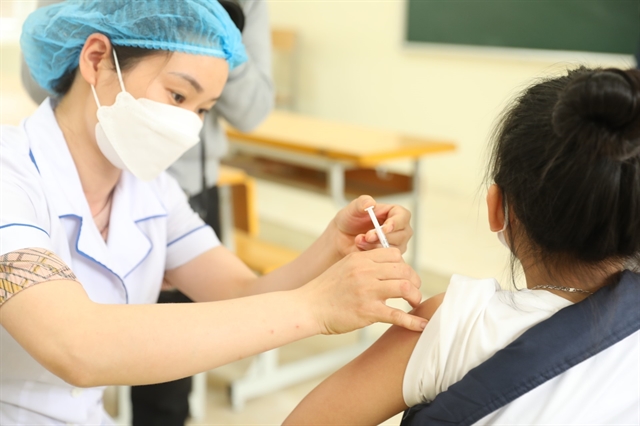 Society
Society

Vaccination is still an important tool in COVID-19 pandemic prevention and control although almost all communes and wards around the country are now listed as low-risk areas.

|
| A medical worker gives a COVID-19 vaccine shot to a secondary school student in Hà Nội.— VNA/VNS Photo Minh Quyết |
HÀ NỘI — Vaccination is still an important tool in COVID-19 pandemic prevention and control although almost all communes and wards around the country are now listed as low-risk areas.
Data from the Ministry of Health shows that there are still over 1.12 million COVID-19 patients being monitored, including 53 severe cases.
This poses a risk of a "double burden" for the health system when summer diseases start to appear, including dengue fever and hand-foot-mouth disease and new diseases such as acute hepatitis of unknown origin and monkeypox.
According to the ministry, the SARS-CoV-2 virus is constantly evolving, so it is difficult to determine the dangerous nature of the variants as well as the degree of aggravation and death.
Currently, Omicron is a common variant but it is not the final variant. It is possible that a new variant of the SARS-CoV-2 virus may emerge.
The new variant might reduce vaccine effectiveness or immunity, causing an increase in severe symptomatic infections or deaths, especially in vulnerable groups.
The ministry also said the pandemic would continue to develop unpredictably because sub-variants had been continuing to appear at a rapid rate.
The pandemic situation in some countries is still complex while the post-COVID-19 impacts have not been fully studied. Moreover, immunity thanks to vaccination is not sustainable, according to the ministry.
Therefore, vaccination is still believed to be an important tool in pandemic prevention and control efforts.
Relevant agencies are told to actively prepare scenarios and plans for every situation and not be negligent.
They have to disseminate knowledge and skills for people to improve their health; warn of new strains; and guide people to take care of their health after being infected with COVID-19.
Accelerating vaccination
In a related movement, the ministry in late May asked heads of provinces and cities to step up the vaccination campaign against COVID-19.
Some localities proposed not receiving vaccines or transferring their allocated doses, meaning the COVID-19 vaccination target is likely to be missed.
The ministry told heads of the provinces and cities to direct the Departments of Health and related agencies to review the number of people who are eligible for COVID-19 vaccination, focusing on completing the administration of third shots for people 18 years old or older in the second quarter of this year as well as inoculation for children from 5 to under 12 years old.
The ministry said that localities which don’t receive enough vaccines for the third and fourth shots for people aged from 18, or children from 5 to under 12 years old, or allow COVID outbreaks, will bear responsibility before the Government and the Prime Minister.
Data from the ministry showed that on June 13, Việt Nam reported 617 new infections of COVID-19, including one imported case, in 37 provinces and cities. Hà Nội continues leading the country with 157 cases, 36 other provinces and cities reported from one to 87 cases, of which 24 provinces and cities reported less than 10.
The average number of new COVID-19 cases in the country recorded over the past seven days is 790 per day.
The new transmissions bring the total caseload to 10,732,429 since the start of the pandemic. The total number of people who have recovered from COVID-19 has reached 9,562,523. — VNS